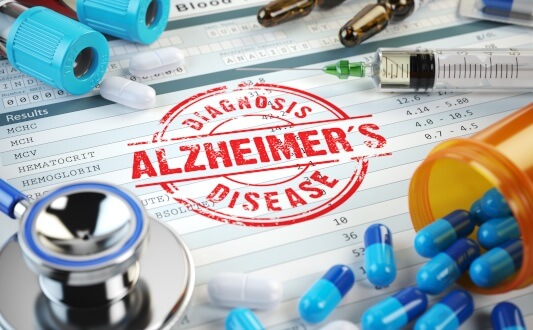A standard clinical protocol for the treatment of Alzheimer's disease (AD) is based on symptomatic treatment. This aims at a slight increase in the viability of neurons that are constantly suffering from the accumulation of toxic amyloid beta. The development of active and passive types of immunization and the use of dendritic cells (DCs) allowed physicians to influence the immediate cause of the disease. Alzheimer's disease vaccines are a new stage of treatment aimed at removing amyloid beta from brain tissue. Clinics in Germany are actively using immunologic agents to improve the quality of life for people suffering from Alzheimer's disease.
Content
- Stage 1: amyloid-specific antibodies for Alzheimer's disease
- Stage 2: beta-amyloid vaccines for Alzheimer's disease
- Stage 3: dendritic cell-based vaccines for Alzheimer's disease
- Treatment of Alzheimer's disease in Germany
Stage 1: amyloid-specific antibodies for Alzheimer's disease
The first attempt to create a dementia vaccine was the development of specific antibodies that directly remove excess amyloid beta from the brain. Different types of antibodies were tested in the research process, such as lecanemab and aducanumab. Subsequently, aducanumab (commercially named Aduhelm) became the first drug for the pathogenetic treatment of Alzheimer's disease to receive FDA approval in the last 20 years. Moreover, approval for its clinical use was granted under an accelerated procedure, thanks to the impressive results of preliminary clinical trials.
Amyloid-specific antibodies are a passive type of immunotherapy that does not affect the functioning of the patient's immune system. Such drugs are indicated for patients with mild to moderate Alzheimer's disease under the age of 80. Amyloid-specific antibodies can also be administered for severe dementia, but the health benefits of their use have not been proven. This means that early diagnosis is important for aducanumab and lecanemab Alzheimer's disease treatment. This is due to the fact that antibodies can prevent brain damage in the early stages of the process, but they are unable to restore its function.
In addition to the obvious advantages, drugs in this group have limitations. This is not surprising because they are essentially pioneers in this field of medicine. The main limitations are the following:
- Intravenous administration occurs once every 2 weeks, so there is a need for fairly frequent visits to the hospital
- Relatively high treatment costs (about $56,000 per year) and, accordingly, low affordability for patients
- The development of amyloid-related imaging abnormalities (ARIA), which requires additional MRI during treatment and increases the already considerable price of therapy
- The risk of developing hemorrhages and local cerebral edema
Another limitation in the use of amyloid-specific antibodies is also the fact that only people living in large cities and having access to large medical centers can undergo such therapy. Nevertheless, drugs are worthy of attention and deservedly considered a revolution in the treatment of Alzheimer's disease because they allow for the fight against the causes of the disease, not just the alleviation of its symptoms. The result of their application is a significant slowdown in the deterioration of cognitive functions. Patients improve memory, thinking, the ability to navigate in time and space, and communication.
Stage 2: beta-amyloid vaccines for Alzheimer's disease
Beta-amyloid vaccines were the first active immunological Alzheimer's vaccines. In 2011, the American company Vaxxinity, which specializes in the development and clinical trials of vaccines for the treatment of chronic progressive diseases, began work on the UB-311 vaccine.
UB-311 is a synthetic drug based on peptides, the action of which is directed against toxic oligomers of amyloid beta (Aβ) and fibrils of this pathological protein. UB-311 vaccination is a type of active immunotherapy when, due to the action of the administered vaccine, the patient's own immune cells are trained to recognize amyloid beta as a target for the attack.
In 2011, a phase I study was launched, namely the Study to Evaluate Safety, Tolerability, and Immunogenicity of UB-311 Vaccine in Subjects With Alzheimer's Disease. This included people aged 50 to 80 with mild to moderate Alzheimer's disease. Thanks to its encouraging results, the drug was granted FDA Fast Track Designation in May 2022 and is currently in Phase IIA clinical trials.
Below are important benefits of the active immune Alzheimer's vaccine over passive immunotherapy:
- Less frequent administration: during clinical trials, the dose of the drug was administered at 0, 4, and 12 weeks compared with the administration of other drugs every 1 week
- More convenient administration: an intramuscular injection compared to intravenous administration of other drugs
- Lower incidence of adverse brain changes (ARIA) during treatment
- The best price-quality ratio
Fast Track Designation is granted to medicines for the treatment of severe or life-threatening diseases that have no analogues on the pharmaceutical market. With a high degree of probability, we can say that this AD vaccine will receive FDA approval and enter clinical practice in the near future. This Alzheimer vaccine is now available only in a limited number of clinics, which are authorized centers for clinical trials.
Stage 3: dendritic cell-based vaccines for Alzheimer's disease
The creation of a dendritic cell-based vaccine marked the beginning of a new chapter in the immunological treatment of Alzheimer's disease. Dendritic cell therapy for Alzheimer's disease induces a specific immune response directed against amyloid beta, which does not trigger immune inflammation of healthy brain tissue. Due to this, the use of dendritic cell-based vaccines for Alzheimer's disease is devoid of the disadvantages of other types of immunotherapy because it does not cause ARIA, hemorrhages, or brain tissue swelling.
The use of DC therapies in AD involves the manufacture of a personalized vaccine based on the patient's blood cells. Such a drug cannot simply be purchased at the pharmacy network because laboratory assistants, doctors, and technologists are working on its creation. Here are the main steps in dendritic cell therapy:
- About 150-200 ml of blood is sampled. During the leukapheresis procedure, monocytes (the source of dendritic cells required for treatment) are isolated from the blood, after which the plasma and other blood components are returned to the patient. Collecting bone marrow-derived dendritic cells may be an alternative.
- Isolation of immature dendritic cell progenitors and their cultivation in laboratory conditions. The laboratory must be certified in accordance with the requirements of the EU-GMP. This stage takes about 7 days.
- Dendritic cells grow in the presence of amyloid beta, specifically amyloid beta with a mutated T-cell epitope. Thanks to this, in the future, they will learn to find amyloid plaques and designate them as targets for attacks by the patient's immune system.
- After 7 days, doctors evaluate the number of mature dendritic cells and their viability. With good results, the stage of drug purification and the removal of non-viable cells begins.
The completed vaccine for Alzheimer's disease is injected subcutaneously into the area of the lymphatic collectors in the head and neck. Patients can additionally receive vitamin preparations. The treatment takes place in a day hospital and is generally well tolerated. The effect of DC therapies in AD persists even after the natural destruction of the vaccine in the body due to the fact that the memory cells of the immune system retain information about the need to attack amyloid beta. Without a doubt, dendritic cell therapy will enter the protocols for the treatment and prevention of Alzheimer's disease after the completion of clinical trials.
Treatment of Alzheimer's disease in Germany
Most neurologists, psychiatrists, and dementia specialists offer standard therapeutic regimens for people with Alzheimer's disease: glutamatergic, cholinergic, and neurotrophic. If you opt to undergo your treatment in Germany, the medical team, however, will not use only this protocol. Physicians at hospitals in this country actively use all possibilities to slow down the progression of the disease in order to improve a person’s ability to communicate with loved ones, work, or cope with everyday tasks.
When treated at German hospitals, you can receive amyloid-specific antibodies or take part in clinical trials of amyloid beta or dendritic cell-based vaccines. The experience of a number of specialized clinics, such as the LDG Laboratories Dr. Gansauge Ulm, allows them to use such vaccines in practice already now.
If you are planning to travel to Germany for treatment from abroad, you can contact Booking Health, a specialized medical tourism agency. The company's medical advisors will study the results of your diagnostic examinations and recommend the best hospital and treatment regimen at the best price. In addition, our company's specialists will help you with the following:
- Making an appointment for your preferred dates without a long wait
- Communicating with the attending physician remotely beforehand if necessary
- Obtaining a visa and preparing the necessary documents for treatment
- Translating the results of previous diagnostic examinations into German so as not to undergo them again
- Arranging flights, transfers, and accommodation
- Undergoing treatment at regular prices in Germany without any surcharges for foreigners
- Keeping in touch with the hospital and physician after the completion of treatment
The Booking Health experience will enable you to effortlessly get the most out of your treatment abroad.
Frequently Asked Questions
Send request for treatmentThe cost of treating Alzheimer's disease depends on the method. Antibody therapy costs about $56,000 per year. UB-311 vaccines have a lower cost due to their easier administration. Dendritic cell therapy costs about €20,000–€38,000 depending on the clinic and treatment program.
In Germany Alzheimer’s patients can access full spectrum of immunological therapies. Treatments are individualized and administered in specialized centers under close monitoring. Also they are combined with supportive care to slow disease progression and enhance quality of life.
Choose treatment abroad and you will for sure get the best results!
See the interview for more information:
INNOVATIVE DENDRITIC CELL TREATMENT IN GERMANY – interview with Prof. Dr. med. Frank Gansauge
Authors:
This article was edited by medical experts, board-certified doctors Dr. Nadezhda Ivanisova, and Dr. Bohdan Mykhalniuk. For the treatment of the conditions referred to in the article, you must consult a doctor; the information in the article is not intended for self-medication!
Our editorial policy, which details our commitment to accuracy and transparency, is available here. Click this link to review our policies.
Sources:
Alzheimer's Research & Therapy
Read:
Treatment of Diseases affecting the Central Nervous System: Cell Therapy
What are the benefits of treating neurological disorders in Germany?
Don't know where to start?
Contact Booking Health






